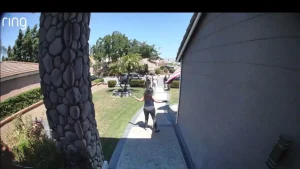
Arpineh and her husband Arthur with their children in happier times before ICE agents arrived at the family’s home
If Arpineh Masihi could vote, she would have cast her ballot for Donald Trump. She’s a devout supporter of the US president – even now that she’s locked up as an illegal immigrant.
“He’s doing the right thing because lots of these people don’t deserve to be here,” Arpineh told the BBC over the phone from the Adelanto immigrant detention centre in California’s Mojave Desert.
“I will support him until the day I die. He’s making America great again.”
Sixty miles (96 km) away in her home in Diamond Bar, a wealthy suburban city in eastern Los Angeles County, a Trump flag flies over the family’s front yard. Maga hats adorn a shelf next to a family photo album, while the family’s pet birds chirp in a cage.
It’s a lively home, with three dogs and four young children, and Arpineh’s husband and mother are bleary eyed and exhausted with worry, trying to put on brave faces.
“Our home is broken,” says Arthur Sahakyan, Arpineh’s husband.
‘We all make mistakes’
In many ways, Arpineh, 39, is an American success story – a prime example of how the country gives people second, even third chances. Arpineh’s mother wells up with tears as she talks about her daughter, who has lived in the US since she was three.
She had a rough patch many years ago, in 2008, when she was convicted of burglary and grand theft and was sentenced to two years in prison. An immigration judge revoked her Green Card, which is a common practice. But because she is a Christian Armenian Iranian, the judge allowed her to remain in the country instead of being deported.
We are Christians. She can’t go back, there’s no way,” Arthur says as their 4-year-old daughter runs in and out of the room. He fears her life would be at risk if she is sent back.

But since her release from prison, Arpineh has rebuilt her life, starting a successful business and a family among hundreds of thousands of Iranian immigrants who call Southern California home.
West Los Angeles – often called Tehrangeles – has the largest population of Iranians outside of Iran.
Some, like Arpineh, have been detained in recent weeks, swept up in immigration raids that have put the city on edge. While the majority of those detained in LA come from Mexico, daily updates from the Department of Homeland Security show immigrants from seemingly every corner of the globe have been arrested.
Trump was elected in part because of his promise to “launch the largest deportation programme of criminals in the history” – a promise Arpineh, her husband and mother say they all still believe in.
Yet her family says they have faith that Arpineh will be released, and believe that only hardened, dangerous criminals will actually be deported.
“I don’t blame Trump, I blame Biden,” Arthur says. “It’s his doing for open borders, but I believe in the system and all the good people will be released and the ones that are bad will be sent back.”
While many of those detained do not have criminal records, Aprineh is a convicted felon, which makes her a prime target for removal.
ICE did not respond to a request for comment about Arpineh’s case.
Arthur says he doesn’t know details of the burglary. They spoke briefly about it before they were married and then he forgot about what he considered a youthful indiscretion by his wife.
Instead, he focuses on his wife’s good deeds over the last 17 years, volunteering with the local school district and bringing food to firefighters and police.
“We all make mistakes,” he says.
No matter what, we’re going to catch you’
So, when ICE phoned Arpineh on 30 June as the family was having breakfast, the couple thought it must be a joke.
But immigration enforcement pulled up to their home 30 minutes later.
Despite signs all over Los Angeles County urging immigrants to “Know Your Rights” and not to open the door to immigration enforcement agents, the couple came outside to speak with the officers.
Arpineh explained how a judge had allowed her to stay in the US because of the situation in Iran, as long as she didn’t commit any other crimes, and as long as she frequently checked in immigration officials. Her last check-in was in April, she showed them, presenting her paperwork.
Arthur even invited them into the house, which they declined, he says.
The immigration enforcement agents told her circumstances had changed and they had a warrant for her arrest.
They allowed her to go back inside and say goodbye to her children – aged 14, 11, 10 and 4. The officers told her that if she didn’t come back outside, they would get her eventually.
“They told us no matter what we’re going to catch you – maybe if you’re driving on the street with your kids – so we thought, what we’d been seeing on the news: flash bombs, cornering cars,” Arthur says. They didn’t want to risk her being violently detained, possibly with their children watching.




